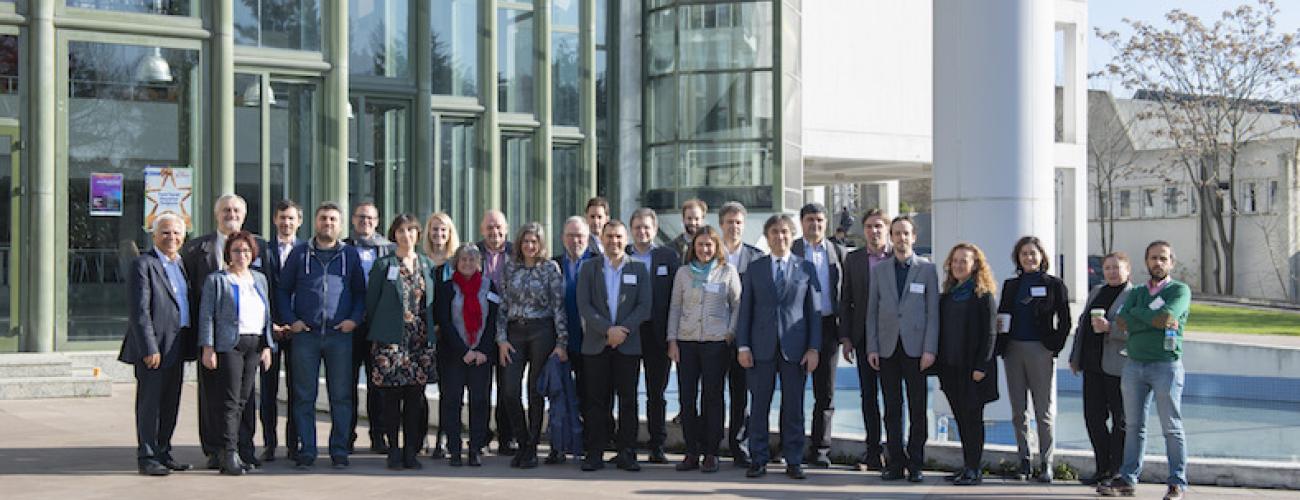
ATHENS, the European University project & doctoral training: ParisTech’s commitment to Europe
Interview with Marie-Christine Bert, Director of International Relations & Corporate Partnerships at the Ecole des Ponts ParisTech, and Antoine Mercier, Deputy Director of International Relations at Chimie ParisTech
Could you update us on the European University project?
AM: The EELISA (European Engineering Learning Innovation and Science Alliance) European university project is a flagship initiative for the three ParisTech schools involved – the Ecole des Ponts ParisTech, Chimie ParisTech and MINES ParisTech. At the end of February we will be submitting a new dossier containing our mission statement, in which the directors of the participating schools outline their shared long-term vision for engineering qualifications in Europe and the place of engineers in today’s society.
MCB: The project builds on the work of the ATHENS network, which brings together a number of leading European universities. It aims to promote the value of French engineering qualifications in a European context and is being coordinated by the Polytechnic University of Madrid in partnership with the Budapest University of Technology and Economics, the Polytechnic University of Bucharest, Istanbul Technical University and the University of Erlangen–Nuremberg. The scope is broader than that of schemes like Erasmus, in that it encompasses three key dimensions:
- Strong ties with industry partners
- Links between teaching and research
- An international focus
In concrete terms, what does the dossier contain?
AM: It sets out a three-year business plan (2021-2024) and our 10-year vision. The European Commission plans to finance 24 new universities in addition to the 17 which have already received funding following the first call for proposals.
Through our involvement in this project, we want to play a leading role in creating something unique and promote the quality of European higher education in a landscape dominated by the Anglo-American model.
MCB: It presents a qualification which is more than just a collection of credits, and which is more focused on the skills employers expect European engineers to have. We are working with the European Network for Accreditation of Engineering Education (ENAEE) to design a single qualification that nonetheless offers students a wide variety of study routes, options and exchange opportunities. The language of teaching is English, but internships add a multilingual dimension. Students are encouraged to attend courses at different establishments, but course content is also made available online.
Our aim is to make these training opportunities attractive to young people, and to young women in particular.
What makes this training opportunity innovative?
AM: It’s more than just a new qualification; we will be putting forward a new framework for training European engineers. Ultimately, this could become a model for the departments of technical universities across Europe, which attract tens of thousands of students.
MCB: The project really is one of its kind and is very different to the engineering master’s courses run by universities. It is characterised by close ties between the university and industry as regards designing courses and defining target skills, and a broad range of activities that provide students with the tools they need to address modern-day challenges.
Greater student mobility also means we have integrated apprenticeship schemes to appeal to companies across Europe.
We are also giving careful consideration to the entry criteria in order to establish a fair selection process and fee structure across different countries. We believe the qualification represents an excellent means of increasing the social openness and diversity of our campuses.
What about the research aspect of the project?
MCB: EELISA is primarily a teaching project because it is part of the Erasmus scheme. However, research is also important, with links between teaching and research established via internships in laboratories and the organisation of conferences and seminars. The qualification focuses on two broad themes:
- Resilient, sustainable, green cities
- Smart and sustainable industry
Both areas should provide a basis for future research projects.
AM: Although research activities are not directly eligible for funding, research is a key element of the project.
In this respect, the flagship project is IDEAL (European soft skills for PhD: enhancing transversal skills through innovative doctoral courses) which brings together four ParisTech schools (AgroParisTech, Arts & Métiers, Chimie ParisTech and MINES ParisTech) and four other European science and technology universities which are also members of ATHENS.
The IDEAL project has two main objectives: firstly, to create an active database of existing doctoral courses oriented towards soft skills and employability in order to foster exchanges between partners and disseminate best practice, and secondly, to provide new, innovative training opportunities in this area.
Ultimately, what is ParisTech’s goal in Europe?
AM: I would say it’s about building on the 20 years of cooperation established through the ATHENS network, which is doing an excellent job of encouraging students from the various partner institutions to undertake exchanges. In ParisTech we have a natural framework within which we can work together on topics relating to engineering in an environment of mutual trust and understanding, and that’s something which facilitates new initiatives.
MCB: We see this training project as a fantastic way of promoting a sense of European identity and citizenship. In order for today’s young people to truly feel European, it is essential that they have access to training programmes that reflect this.

